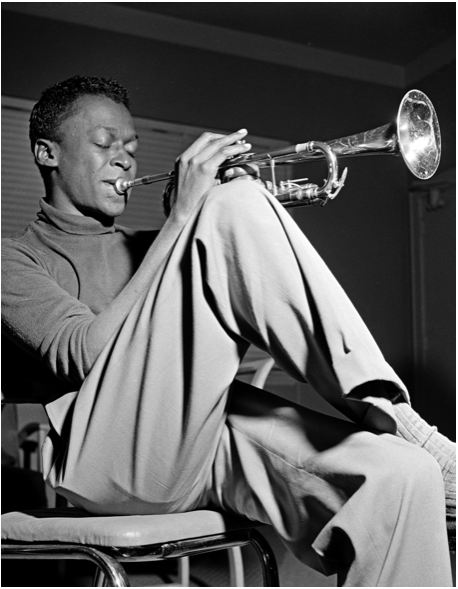A Look Back in Music History
Miles Davis: The Birth of the “Cool”
by Hannah Hiebert
Welcome to the “Music History” column! In this column we are going to briefly discuss one of the most distinguished and influential jazz musicians of the twentieth century. Allow me to introduce you to Miles Davis!
A trumpeter, band leader, and composer all in one, Davis was at the forefront of nearly every major development in jazz from World War 2 all the way up to the 1990s. He was partially responsible for the creation of modal jazz, which in turn allowed for “jazz fusion” to arise from his work alongside other musicians during the late 1960s and into the early 1970s. It was Davis’s send recordings, along with live performances of his many influential bands, that lead to the acceptance of jazz as music with long-lasting artistic value.
Between 1950 and 1955, Davis primarily recorded music as a leader for Prestige Records and Blue Note records within a wide range of small-group settings. Around this time, Davis was heavily influenced by pianist Ahmad Jamal, whose style greatly contrasted with the often “busy” sound of what was then referred to as BeBop. Davis would then go on to frequently play in the jazz clubs of New York.
After overcoming addiction, Davis created a series of important recordings for Prestige Records in 1954 that could later be collected on albums including: “Bags Groove, Miles Davis and the Modern Jazz Giants”, and also, “Walkin”. It was around this time that Davis began to use the Hermon mute to darken the timbre of his trumpet. It was this very trumpet tone that would be associated with Davis throughout the duration of his career. By 1955, Davis successfully formed his first incarnation of the renowned, “Miles Davis Quintet”. The first recordings of the group were made for Columbia Records and would later be released on “‘Round About Midnight”. Even in the present day, the Miles Davis Quintet is often recognized as one of the greatest musical groups in the history of jazz.
Much later in his life, Davis would continue touring with a band of constantly changing personnel and critical stock at a higher level than it ever had been before. His last recordings were the hip-hop influenced studio albums “Doo-Bop” and “Miles and Quincy Live at Montreux”, a collaboration done with Quincy Jones himself for the 1991 Montreux Jazz Festival. It was here that Davis would perform repertoire from this classic 1960s recordings for the first time in decades.
Miles Davis’s music is still held in high regard by jazz musicians in the present day. His music would go on to be learned and performed by high school jazz bands, small jazz ensembles, and would forever be remembered as, “The Birth of the ‘Cool’”.
Source for Research Provided by: “NewWorldEncyclopedia.org”

